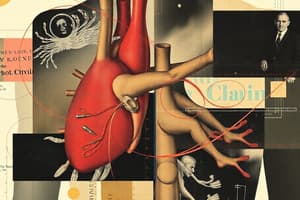Podcast
Questions and Answers
Which receptor type, when stimulated by cholinergic agonists, primarily affects smooth muscles and slows heart rate?
Which receptor type, when stimulated by cholinergic agonists, primarily affects smooth muscles and slows heart rate?
- Alpha receptors
- Nicotinic receptors
- Muscarinic receptors (correct)
- Beta receptors
A patient is prescribed Bethanechol Chloride. The nurse anticipates which of the following therapeutic effects based on the drug's mechanism of action?
A patient is prescribed Bethanechol Chloride. The nurse anticipates which of the following therapeutic effects based on the drug's mechanism of action?
- Bladder contraction (correct)
- Decreased bowel sounds
- Pupil dilation
- Increased urinary retention
A patient taking Bethanechol Chloride reports blurred vision and increased sweating. Which of the following actions should the nurse prioritize?
A patient taking Bethanechol Chloride reports blurred vision and increased sweating. Which of the following actions should the nurse prioritize?
- Monitoring the patient for signs of overdose
- Administering an antihistamine
- Reassuring the patient that these are expected and harmless side effects.
- Withholding the next dose and notifying the healthcare provider (correct)
When administering Bethanechol Chloride, the nurse understands the importance of monitoring which vital sign closely due to the drug's potential side effects?
When administering Bethanechol Chloride, the nurse understands the importance of monitoring which vital sign closely due to the drug's potential side effects?
A patient with a history of asthma is prescribed Bethanechol Chloride. The nurse should closely monitor for which potential adverse effect?
A patient with a history of asthma is prescribed Bethanechol Chloride. The nurse should closely monitor for which potential adverse effect?
Which of the following instructions is most appropriate for a nurse to provide to a patient who is newly prescribed Bethanechol Chloride?
Which of the following instructions is most appropriate for a nurse to provide to a patient who is newly prescribed Bethanechol Chloride?
Following an accidental overdose of Bethanechol Chloride, a patient exhibits excessive salivation and muscle weakness. Which medication should the nurse prepare to administer?
Following an accidental overdose of Bethanechol Chloride, a patient exhibits excessive salivation and muscle weakness. Which medication should the nurse prepare to administer?
A patient is being treated with Bethanechol Chloride. Which assessment finding would indicate that the medication is having the desired therapeutic effect?
A patient is being treated with Bethanechol Chloride. Which assessment finding would indicate that the medication is having the desired therapeutic effect?
Flashcards
Cholinergic Agonists
Cholinergic Agonists
Drugs that stimulate the parasympathetic nervous system.
Acetylcholine
Acetylcholine
A neurotransmitter that cholinergic agonists mimic.
Muscarinic Receptors
Muscarinic Receptors
Receptors that affect smooth muscles and slow heart rate when stimulated.
Nicotinic Receptors
Nicotinic Receptors
Signup and view all the flashcards
Bethanechol Chloride
Bethanechol Chloride
Signup and view all the flashcards
Side Effects of Bethanechol
Side Effects of Bethanechol
Signup and view all the flashcards
Bethanechol Monitoring
Bethanechol Monitoring
Signup and view all the flashcards
Bethanechol Overdose
Bethanechol Overdose
Signup and view all the flashcards
Study Notes
- Cholinergic agonists stimulate the parasympathetic nervous system.
- They mimic acetylcholine.
- Muscarinic receptors are a type of receptor affected by cholinergic agonists.
- Cholinergic agonists affect smooth muscles and slow heart rate.
- Nicotinic receptors are also affected by cholinergic agonists.
- Cholinergic agonists affect skeletal muscles.
Effects of Cholinergic Agonists
- In the eye, cholinergic agonists constrict the pupil.
- In the lungs, cholinergic agonists constrict bronchioles and increase secretions.
- In the heart and blood vessels, cholinergic agonists decrease heart rate and dilate blood vessels.
- In the gastrointestinal system, cholinergic agonists increase peristalsis and secretions.
- In the bladder, cholinergic agonists constrict the bladder.
- In salivary and sweat glands, cholinergic agonists increase secretions.
Bethanechol Chloride
- It stimulates cholinergic receptors.
- This stimulation causes contraction of the bladder.
- It increases GI secretions and peristalsis.
- Bethanechol chloride increases bronchial secretions and bronchoconstriction.
- It constricts pupils.
- Bethanechol chloride treats urinary retention.
- Side effects/adverse reactions include blurred vision.
- Increased secretions in the lungs, GI tract, and sweat may occur.
- Orthostatic hypotension may occur
- Other side effects include bronchoconstriction, hypotension, and tachycardia.
Interventions for Bethanechol Chloride
- Monitor vital signs and watch for a decrease in BP and pulse.
- Monitor lung sounds.
- Monitor GI/GU status.
- Monitor and record intake & output.
- Administer 1 hour before or two hours after meals.
- Monitor for overdose.
- Signs and symptoms of overdose include muscular weakness & increased salivation.
- Atropine is an antagonist.
Teaching for Bethanechol Chloride
- Teach the client to monitor their BP and heart rate.
- Teach the client to rise slowly from a lying position to prevent orthostatic hypotension.
- Teach the client to take it on an empty stomach one hour before or two hours after meals.
- Teach the client to report increased muscle weakness or salivation.
- The evaluation is client able to empty bladder.
Pilocarpine
- Pilocarpine constricts the pupil, opening the canal of Schlemm to promote drainage of the aqueous humor.
- Pilocarpine use helps decrease pressure in the eye in diseases such as glaucoma.
- It is given as eye drops.
Studying That Suits You
Use AI to generate personalized quizzes and flashcards to suit your learning preferences.
Related Documents
Description
Cholinergic agonists stimulate the parasympathetic nervous system by mimicking acetylcholine. These agonists affect muscarinic and nicotinic receptors, influencing smooth muscles and heart rate. Bethanechol chloride, a specific cholinergic agonist, stimulates cholinergic receptors, causing bladder contraction and increased GI secretions.





